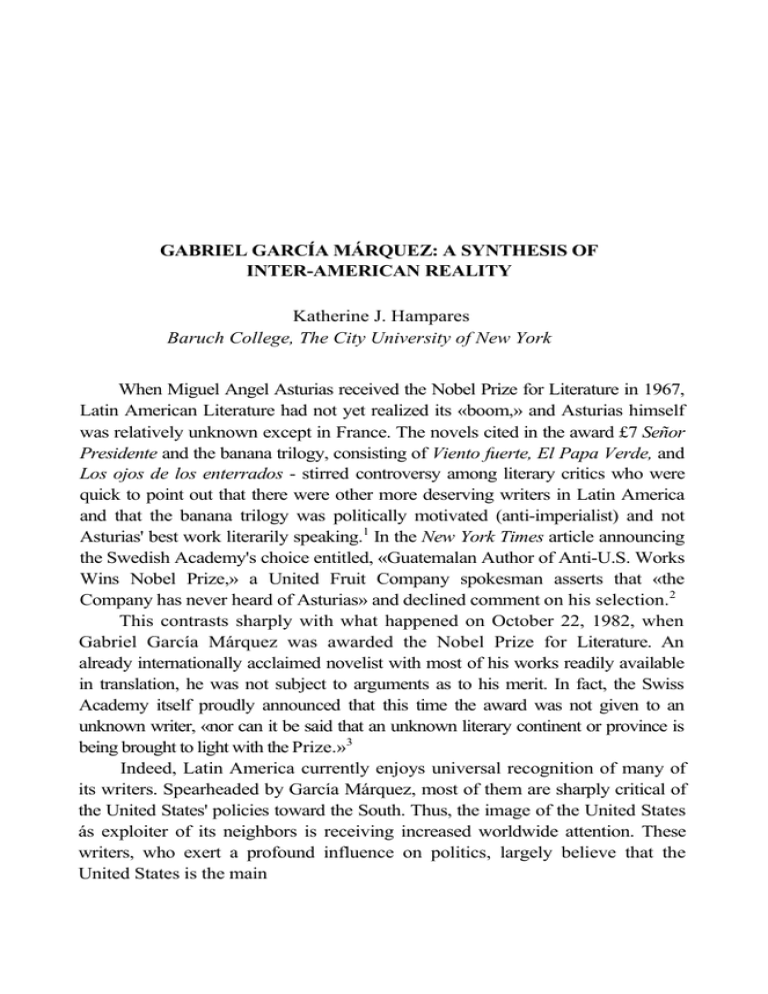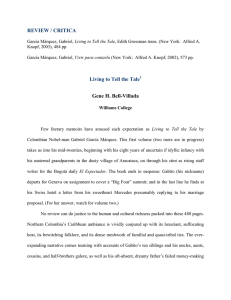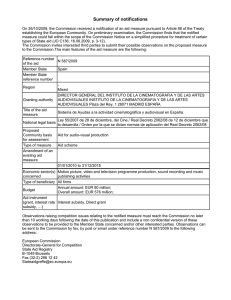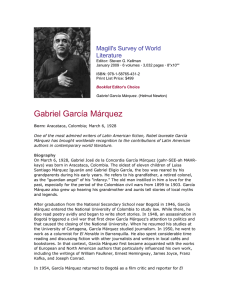GABRIEL GARCÍA MÁRQUEZ: A SYNTHESIS OF INTER
Anuncio

GABRIEL GARCÍA MÁRQUEZ: A SYNTHESIS OF INTER-AMERICAN REALITY Katherine J. Hampares Baruch College, The City University of New York When Miguel Angel Asturias received the Nobel Prize for Literature in 1967, Latin American Literature had not yet realized its «boom,» and Asturias himself was relatively unknown except in France. The novels cited in the award £7 Señor Presidente and the banana trilogy, consisting of Viento fuerte, El Papa Verde, and Los ojos de los enterrados - stirred controversy among literary critics who were quick to point out that there were other more deserving writers in Latin America and that the banana trilogy was politically motivated (anti-imperialist) and not Asturias' best work literarily speaking.1 In the New York Times article announcing the Swedish Academy's choice entitled, «Guatemalan Author of Anti-U.S. Works Wins Nobel Prize,» a United Fruit Company spokesman asserts that «the Company has never heard of Asturias» and declined comment on his selection.2 This contrasts sharply with what happened on October 22, 1982, when Gabriel García Márquez was awarded the Nobel Prize for Literature. An already internationally acclaimed novelist with most of his works readily available in translation, he was not subject to arguments as to his merit. In fact, the Swiss Academy itself proudly announced that this time the award was not given to an unknown writer, «nor can it be said that an unknown literary continent or province is being brought to light with the Prize.»3 Indeed, Latin America currently enjoys universal recognition of many of its writers. Spearheaded by García Márquez, most of them are sharply critical of the United States' policies toward the South. Thus, the image of the United States ás exploiter of its neighbors is receiving increased worldwide attention. These writers, who exert a profound influence on politics, largely believe that the United States is the main obstacle to social and economic reform. García Márquez defines the problem in this manner: Reagan can't accept that the current struggle in Latin America has internal causes - injustice, inequality, and oppression. For him, all acts of legitimate revolt are Soviet operations: these aren't countries but pawns. That's very grave for our identity. We don't exist. In this way, he's succeeded in turning intellectuals unanimously against him.4 Although García Márquez is a political activist using his fame and money to promote socialist revolution, he believes that each country must seek its own solutions. For this reason, he has been critical of Cuba on some occasions because of its close ties to the Soviet Union. Nonetheless, the novelist affirms that the positive aspects of the Cuban Revolution are more important and numerous than its negative features.5 Despite his many trips to Cuba and his friendship with Castro, he admits that he could never live there: I could not live in Cuba because I haven't been through the process ... it would be very difficult to arrive now and adapt myself to the conditions. I'd miss too many things. I couldn't live with the lack of information. I am a voracious reader of newspapers and magazines from around the world.6 But the novelist's political activities have earned him the status of persona non grata with the U.S. State Department. As García Márquez puts it, he is issued a visa in order «to deliver a lecture at Columbia,» yet he admires the United States: North America's authors are the literary giants of the twentieth century ... New York is the greatest phenomenon of our time ... There is no way one can relate to contemporary cultural life without going to the United States . . . the place with the most serious students and best analyses of my work. Yet the State Department plays this game with me in which I may or may not be able to go there.7 As for his views of literature, García Márquez affirms that «toda gran literatura tiene que fundarse en una realidad concreta.»8 He rejects the notion that art should be sacrificed to social protest: «El gran deber del escritor es escribir bien. Ese es mi compromiso.»9 Social protest is skillfully woven into the web of history, myth, and fantasy. For example, the incidents surrounding the banana company in Cien años de soledad seem absurd, but they are logical exaggerations of the truth; the author contends that all the events - including the dances to flaming pesos, the blue pill dispensed by the company doctors, and the portable latrines - are documented in the National Archives.10 García Márquez's work is the product of personal and national historical drama. He was born in Aracataca (alias Macondo) in 1928, the year of the massacre related in Cien años.11 As described in La hojarasca, his first novel, the area experienced the banana boom and bust within a few years. Raised by his grandparents, the novelist has often said that his literature springs from the anecdotes that he heard from his grandfather. When the author was eight years old, his grandfather died, and about this, he says: «Desde los ocho años no me ha pasado nada importante. Antes viví mucho.»12 The themes that haunt his work- solitude, decadence, violence, and human exploitation - are rooted in national and inter-American history. Violence and machetismo have plagued Colombians for decades. As one historian notes: Among the seventy nation-wide examples of machetismo in Colombia in the nineteenth century, one conflict alone is estimated to have cost approximately 80,000 lives. About 100,000 lives were lost in the War of a Thousand Days (1899-1903).»13 The 1948 bogotazo sharpened the conflict between Liberals and Conservatives; the ensuing bloodshed has lasted through the 1960's. Inter-American history is riddled with equally phantasmagorical chapters, especially at the turn of the century when the United States occupied and intervened in several Central American and Caribbean countries owing to non-payment of debts.14 Colombians will always remember the Panama Canal events and Theodore Roosevelt's arrogance: «I took the Canal Zone. Every action taken was not merely proper but was carried out in accordance with the highest, finest and nicest standards of public and governmental ethics.»15 What García Márquez has done, then, is to capture the essence of Latin American reality which heretofore was termed «novela sin novelistas.» Throughout his literary production, namely from La hojarasca (1955) to El otoño del patriarca (1975), there has been a constant preoccupation with gringo imperialism. The banana company that appears in Cien años de soledad is first introduced in La hojarasca symbolized by the leaf storm that brought everything and took everything awav: De pronto, como si un remolino hubiera echado raíces en el centro del pueblo, llegó la compañía bananera perseguida por la hojarasca. Era una hojarasca revuelta, alborotada, formada por los desperdicios humanos y materiales de los otros pueblos ... Entonces pitó el tren por primera vez. La hojarasca volteó y salió a recibirlo y con la vuelta perdió el impulso, pero logró unidad y solidez; y sufrió el natural proceso de fermentación y se incorporó a los gérmenes de la tierra.16 The central figure of the story, the doctor, who hanged himself after being locked up in his room for ten years, had lost all his patients to the company doctors after it was decreed that proof of medical degrees was needed in order to practice medicine. He had also incited the wrath of the townspeople by refusing to tend to a group of wounded men in a bitterly fought election. The boom and bust tactics of the banana company has left behind a town that is ravaged both individually and collectively. But it is important to note that there are no gringo characters. There are allusions to the banana company and imperialism in other stories,17 but the one that is a symbolic retelling of La hojarasca and includes a North American character is «El mar del tiempo perdido.»18 In this story, Mr. Herbert symbolized the United States' economic and political policies toward Latin America. He appears within an aura of hope, for a smell of roses has permeated the desolate town; no one can believe that it comes from the sea since only garbage, crabs, and dead fish have been washed ashore in the past. The heretofore condemned town is coming to life as everyone flocks to the area beckoned by the local priest who is convinced that the fragrance denotes them as «the chosen people» of God. Mr. Herbert arrives in the midst of a carnival. He sets up a table in the middle of the street and places two trunks full of money on it, boasting: Tengo tanto dinero que ya no encuentro dónde meterlo. Y como además tengo un corazón tan grande que ya no me cabe dentro del pecho, he tomado la determinación de recorrer el mundo resolviendo los problemas del género humano.19 Mr. Herbert rings his bell to bring the villagers to attention; he speaks loud and fast and waves «unas manos tibias y lánguidas que siempre parecían acabadas de afeitar.»20 When interrupted by a man who shouts that he should stop talking so much and start handing out the money, he replies: «Repartir el dinero, sin ton ni son, además de ser un método injusto, no tendría ningún sentido.»21 He then proceeds to illustrate «el más equitativo sistema de distribución de la riqueza» by calling the man forward and asking him what his problem is. Patricio explains that he needs 48 pesos. When asked what he can do to earn the money, he answers that he imitates birds well. Thus, he imitates the songs of 48 birds and receives his money amidst the applause of onlookers. Old Jacob, who needs 20 pesos, and is the town's champion checkers player, waits to see Herbert; but at midnight, the gringo packs up and goes to the local tavern, followed by the crowds who carry the trunks for him. After asking a woman in the tavern what her problem was and being told in gross terms that she was a prostitute and that he should mind his own business, a young woman approaches him asking for 500 pesos. When asked how much she would charge per male customer, she answers «5 pesos»; Herbert declares that this means one hundred men; she replies: «Si consigo toda esa plata junta, éstos serán los últimos cien hombres de mi vida.»22 Herbert spends the night sending men to the woman and even giving money to potential customers to pay their way. Finally, it is old Jacob's turn, and a table is set up in the middle of the street for the checkers game with Herbert. Jacob loses repeatedly to Herbert even when the latter is blindfolded and ends up owing 5,742 pesos. When he offers to spend the rest of his life paying back the money, Herbert retorts that it is due in twenty minutes. In order to satisfy the debt, Jacob loses his only possession, his house. Herbert then calls for a week of festivities, including music, fireworks, and acrobats. He even sketches the city of the future with skyscrapers and dance floors, but the villagers cannot identify with it. Obviously, only Herbert has reason to celebrate, for he is now the owner of everyone's property and he feels omnipotent. This is seen when old Jacobs tells him that he will die from so much partying, and he replies: «Tengo tanto dinero que no hay ninguna razón para que me muera.»23 When the week is over, Herbert rings his bell to signal the end of the festivities, and he takes an endless nap. He sleeps so long that all hopes for progress are dashed, and the priest now believes that the town is for the accursed, not the chosen, people. The priest, who hoped to secure money from the gringo to build a church in order to keep hope alive, gives up his plan and leaves the area. Snoring like a lion in Jacob's house, Herbert's breathing uses up so much air that things lose their weight and are floating about. When he finally wakes up, he is hungry and joins the others who must dig up crabs to survive: «Tobías lo encontró escarbando en la arena con la boca llena de espuma, y se asombró de que los ricos con hambre se parecieran tanto a los pobres.»24 Up to this point, the story is a masterful synthesis of the United States' economic and political policies toward Latin America. Herbert's first speech is imbued with a missionary zeal and vestiges of the Manifest Destiny. Economic imperialism has left the town worse off than it was before Herbert came; thus, false hope through foreign investment is exposed for what it is: no hope at all for progress of the local people even though Herbert thinks that there is reason to celebrate. What happens to Jacob - who fares so poorly because he has dared to match wits with Herbert- represents what happened to countries that could not live up to commitments of repayment of U.S. loans: political favors were given that were tantamount to «selling» the country, just as had happened to Jacob's house. Herbert is in control of the situation at all times, implying the North's intervention in the South. Finally, his long sleep symbolizes a common complaint of Latin America, particularly after World War II: a tendency, on the part of the United States, to ignore or neglect its neighbors to the South. The Good Neighbor Policy ended in 1945 and great disillusionment set in about the United States which began heavy investment in Latin America but ignored the South politically; by the 1950's, inter-American relations reached a nadir.25 The last part of the story is less clear. Herbert asks Tobias to go on a turtle hunt. In the depths of the sea, they find long-lost cities and dead people who float past them. Herbert, swimming like an octopus, is amazed by what he sees, but he tells Tobias not to tell anyone about it because it would cause great disorder if people knew what was in the depths of the sea. Upon their return, they feast on the turtle that Herbert had captured, and Herbert concludes that they must face reality: the smell of roses will never return. Tobías' wife replies that it never really happened. Herbert decides to leave, saying: «De modo que me voy. También ustedes debían irse. Hay muchas cosas que hacer en el mundo para que se queden pasando hambre en este pueblo.»26 In the end, Tobías and his wife do not even enjoy love-making. His wife does not believe any of his accounts about the underwater adventure. Thus, the past (sea of lost time) is as unreal as the present (smell of roses) and the future (dream city described by Herbert). A similar theme is reinforced in Cien años de soledad (1967), which recounts the saga of the banana company. The gringos are cleverly introduced in Chapter 12 (of 20 unnumbered chapters) amidst the technological inventions that Macondo rejects: the movies, phonograph, and telephone. The people are so dazzled by all these inventions, as well as the circus-like people brought by the yellow train, that they lose sense of where the limits of reality lie. To add to their confusion, the burlesque gringos appear: Entre esas criaturas de farándula, con pantalones de montar y polainas, sombrero de corcho, espejuelos con armaduras de acero, ojos de topacio y pellejo de gallo fino, uno de tantos miércoles llegó a Macondo y almorzó en la casa el rechoncho y sonriente Mr. Herbert.27 This time Herbert is in the hot air balloon business, but no one in Macondo is interested in riding his balloons since everyone already has seen the gypsies' flying carpets. Aureliano Segundo finds him complaining in broken Spanish about the lack of rooms at the hotel, and he invites him to his house. Herbert is about to leave on the next train when at lunch he tastes a banana. He eats a whole bunch of bananas, then takes out optical instruments (from a toolbox that he always carries) and begins to examine a banana meticulously. Herbert exercises the care of a diamond merchant as he dissects the banana, weighs it, and calculates its breadth. He then measures the temperature, level of humidity, and the intensity of the light. Everyone at the table is intrigued by his activities, awaiting his final judgment, but he says nothing. On the following days, Herbert is seen hunting butterflies with a net and basket. Apparently, he is a «front man» trying to camouflage the gringos' real intentions, for the next train brings engineers, agronomists, hydrologists, topographers, and surveyors who study the same areas where Herbert had hunted the butterflies. Mr. Herbert disappears from the novel and Mr. Brown with his associates of the banana company take over. We are now dealing with ruthless imperialists reminiscent of Asturias' Green Pope. When the villagers see lawyers with black suits, they are reminded of the ones that they had seen with Coronel Aureliano Buendía, and they fear that a war is in the making. No one really knows what the gringos want; some even conjecture that they may be philanthropists. Nonetheless, they set up their own area on the other side of the railroad tracks and surround it with electrified chicken wire. Endowed with divine powers, they change the course of the rains, accelerate the crop cycle, and alter the course of the river to the other side of the cemetery. Moral corruption is ushered in by the prostitutes, gambling operations, and sex orgies that accompany the gringos. Within eight months, so many changes have taken place that the local people do not recognize their own town. As Aureliano Buendía puts it: «Miren la vaina que nos hemos buscado no más por invitar a un gringo a comer guineo.»28 The train, which formerly was introduced in order to promote the ice business, becomes a symbol of destruction instead of progress: it becomes the means to transport gringos, bananas, and corruption, and even death (the massacre toward the end of the novel). The train's arrival marks historical time and its horn signals hope, but like Herbert's bell in the short story, it is false. In the meantime, the Buendia home is transformed into a hotel catering to the gringos, who are guests of the worst kind but expect to be treated like kings. While Coronel Aureliano Buendia locks himself up in his room in order to avoid the strangers ' intrusion, Ursula delights in trying to please them. Remedios, who represents purity, is the only person who «permaneció inmune a la peste del banano,» in spite of her provocative odor that drove men insane with desire. On one occasion when Remedios is bathing herself, agringo removes some tiles from the roof in order to watch her bathe. He asks to soap her body or just her back, whereupon she replies that she has two hands to do it with; furthermore, no one washes his back. While she is drying herself, the stranger asks her to marry him, but she retorts that she could never marry someone who is silly enough to waste his lunch hour merely to watch a girl bathing. When she puts on her cassock while still nude, the gringo removes more tiles from the ceiling whereupon the ceiling collapses plunging him to his death on the cement floor. Another gringo who tries to touch her when she passes through the banana plantations, meets an equally ridiculous death: he is kicked by a horse, thus crushing his chest as he falls down drowned in his own blood. Finally, when Remedios ascends to the heavens clutching the sheets that she was folding, only the gringos deny the miracle. They claim that the family has invented the incident in order to protect their reputation since Remedios was not as pure as they pretended. Not only is this a rejection of someone who has rejected the North American presence in Latin America but also exemplifies the gringos' inability to dream or to believe in miracles. As Mr. Brown replaces the local police with hired assassins, injustice and brutality are so rampant that Coronel Aureliano Buendia shouts: «Un día de éstos voy a armar a mis muchachos para que acaben con estos gringos de mierda.»29 Within a week, sixteen of his seventeen sons are mysteriously killed though the Church is implicated in the crimes since the indelible ashes of Ash Wednesday marked their identity forever. Not only are the North Americans associated with useless technology, corruption, and war but also with sarna (a highly contagious skin rash usually associated with dogs). Because of the dread diseases, Fernanda forbids anyone to enter the house if they are associated with the banana company because they can spread sarna (apparently meant to symbolize ambition, materialism, and all that is connected with the United States). Thus, even Fernanda's brother-in-law, José Arcadio Segundo, is prohibited from visiting the house when he becomes a foreman of the company. Finally, when the workers strike, the military take over their jobs, and the workers try to sabotage their efforts. The workers complain about the use of a blue pill for all illnesses and the fact that the portable latrines are provided for every fifty people and only at Christmastime. When their demands are made public, Mr. Brown and his associates disappear. The company lawyers, «ilusionistas del derecho,» produce a death certificate as evidence that Brown was run over by a fire truck in Chicago. In court, the workers have an even greater surprise, for they are told that they technically do not exist: «La compañía bananera no tiene ni tendría jamás trabajadores a su servicio sino que los reclutaba ocasionalmente con carácter temporal.»30 By now, José Arcadio Segundo has quit the company and joined the striking workers who are told to go to the railroad station to discuss a settlement. This is a trick to have them massacred. They are given five minutes to disperse, but before the time is up, the machine guns open fire. When José Arcadio Segundo regains consciousness, he is on a train bearing 3,408 corpses to the sea. The government has made official statements that the workers' demands were satisfied, and that the crowd had dispersed. Only josé Arcadio Segundo knows that the schoolbook versions of the strike are false, and he dies muttering the truth. When Brown is confronted with announcing the date for an agreement, he glimpses lightning in the sky and declares, «Será cuando escampe,»; the torrential downpour lasts for four years, eleven months, and two days. Macondo is destroyed. Apocalyptic as the ending is, García Márquez does not stop here: Macondo, whose inhabitants lived without love, hope, or human solidarity, is wiped off the face of the earth by a cyclone. While Asturias had hoped for a revolution by the masses to succeed in changing the social order (Los ojos de los enterrados), García Márquez sees no hope for inner reform of the old order. A fresh, new beginning is needed, much like a genesis free from sin and human failings of the kind exemplified by the Buendías and the banana company. Evil triumphs in a definitive manner; even the gods are accomplices of the gringos, and Macondo deserves no mercy. Without resorting to terms like «imperialism» or «exploitation,» García Márquez has written a strong indictment of decadence and human exploitation. The most tragic idea imparted is that no change is possible because people do not have the political sophistication or resources to change their condition. Although in real life, the novelist is a revolutionary, his fiction does not seek to change the world, but rather, the reader's view of it. This is even more apparent in the last novel, El otoño del patriarca (1975).31 While Cien años de soledad is based on concrete realities, the last novel gives free rein to an imagination that is politically committed but not limited to a realistic rendering of the social ills it condemns. Neither the characters not the incidents in El otoño del patriarca are meant to be credible; rather, they provoke outrage in a highly experimental and complex novel, which is more important for its structural innovation than for its social protest. Like many novels on dictatorship, the patriarch symbolizes all dictators in a timeless and spaceless manner. The fact that the patriarch lives from 107 to 232 years attests to dictatorship's durability. But unlike other fictional dictators, the patriarch not only dies a natural death but also lives a life in which he commands without power, is exalted without glory, and is obeyed without authority. Having been put into power by the British, the patriarch is kept in power by the United States. When the national debt gets out of control and civil unrest needs to be quelled, the gringos are summoned by the dictator, who uses a plague as the pretext.32 But the exploitation of the British, Dutch, and Germans, then the gringos, has left the country with no resources, for even the subsoil rights have been lost so that «estamos como estamos debiendo hasta los calzoncillos que llevamos puestos.»33 Since the country has nothing more to offer but the sea that surrounds it, the gringos (no characters as such but merely a stream of ambassadors' names) insist on taking the sea, or else, the battleship and marines lurking in the harbor will launch an invasion: ya no estamos en condiciones de discutir, excelencia, el régimen no estaba sostenido por la esperanza ni por el coformismo, ni siquiera por el terror, sino por la pura inercia de una desilusión antigua e irreparable ... o vienen los infantes o nos llevamos el mar . . . de modo que se llevaron el Caribe en abril, se lo llevaron en piezas numeradas los ingenieros náuticos del embajador Ewing para sembrarlo lejos de los huracanes en las auroras de sangre de Arizona, se lo llevaron con todo lo que tenía dentro . . .34 That the American engineers could fathom such a project is in keeping with the idea of their omnipotence, an oft-repeated theme concerning gringos. Mention is made of the massacre of Cien años de soledad when it is asserted that this is the reason that no one dares to protect the taking of the sea. Revolution, then, has been effectively eliminated as a solution: nadie salió mi general porque nadie olvidaba que otra vez nos habían dicho lo mismo bajo palabra de militar y sin embargo los masacraron a tiros con el pretexto de que había provocadores infiltrados que abrieron fuego contra la tropa, así que esta vez no contamos ni con el pueblo mi general . . .35 In this novel, no one but the dictator has to be appeased; thus, the palliative for «el mal negocio del mar» is not a celebration, but rather, a gift from ambassador Eberhart to the patriarch: a wind machine or «máquina de vientos» that will apparently imitate the breezes that the sea had given.36 In spite of the difficulty in reading a novel consisting of six sentences that divide the six chapters with virtually no punctuation, the message is clear: the masses can do little against dictatorship, and U.S. imperialism will flourish unchecked in the foreseeable future. The last line of the novel, «el tiempo incontable de la eternidad había por fin terminado,» presages a new order to transcend the present one, but it will come about in a natural way, just as the dictator had died. In conclusion, García Márquez has synthesized the inter-American reality explored by other novelists.37 The message against imperialism is even stronger than in his predecessors, for it is woven into the realm of fantasy with consummate skill. Of him it cannot be said that artistry has been sacrificed to social protest, as in the case of Miguel Angel Asturias; nor can it be said that García Márquez has done the opposite. What can be said is that he has accomplished the aesthetic and political culmination of social protest literature by endowing it with a universal dimension that gives every reader a new view of the human condition, a characteristic found in all great literature. NOTES 1 Alexander Coleman, «Why Asturias?,» The New York Times Book Review, November 19, 1967, pp. 1-3. 2 Werner Wiskari, «Guatemalan Author of Anti-U.S. Works Wins Nobel Prize,» p. A 44. 3 John Vinocur, «García Márquez Wins Nobel; Radical Colombian Novelist,» The New York Times, October 22, 1982, p. A 1. 4 Ibid., p. A 10. 5 Alan Riding, «ForGrarcía Márquez, Revolution is a Major Theme,» The New York Times, May 22, 1980, p. A 2. 6 Ibid. 7 Marlise Simons, «A Talk with Gabriel Gárcia Márquez,» The New York Times Book Review, December 5, 1982, p. 61. 8 Gabriel García Márquez and Mario Vargas Llosa, Diálogo (Buenos Aires: Ediciones Latinoamericanas, 1972), p. 54. 9 Ibid., p. 59. 10 Ibid., pp. 32-36. 11 Gabriel García Márquez, El olor de la guayaba: Conversaciones con Plinio Apuleyo Mendoza (Barcelona: Editorial Bruguera, S. A., 1982), pp. 139-140. 12 García Márquez and Vargas Llosa, Diálogo, p. 94. 13 William S. Stokes, Latín American Politics (New York: Crowell, 1959), pp. 307-308. 14 Hubert Herring, A History of Latin America (New York: Alfred A. Knopf, 1968), p. 799. 15 Ibid., p. 549. 16 Gabriel García Márquez, La hojarasca (Barcelona: Plaza y Janés, S. A., 1974), pp. 7-9. From the beginning and end of the prologue, which is dated 1909. 17 For example, «Un día después del sábado,» written in 1955, is part of Los funerales de la Mamá Grande (Buenos Aires: Editorial Sudamericana, 1978), and mentions the banana workers' massacre (p. 132) of Cien años de soledad. Another story in the same collection, «La siesta del martes,» describes the stifling and oppressive atmosphere of the banana plantations (p. 11). 18 Gabriel García Márquez, «El mar del tiempo perdido,» in the short story collection, La increíble y triste historia de la Cándida Eréndira y de su abuela desalmada (Barcelona: Editorial Bruguera, S. A., 1972), pp. 17-49. The story first appeared in 1961 in Revista Mexicana de Literatura. 19 Ibid., p. 28. 20 Ibid., p. 29. 21 Ibid. 22 Ibid., p. 32. 23 Ibid., p. 34. 24 Ibid., p. 36. 25 Donald M. Dozer, Are We Good Neighbors? Three Decades of Inter-American Relations, 1930-1960 (Gainesville: University of Florida Press, 1961), pp. 373-375. 26 «El mar del tiempo perdido,» p. 39. 27 Gabriel García Márquez, Cien años de soledad (Buenos Aires: Editorial Sudamericana, 1969), p. 195. 28 Ibid., p. 198. 29 Ibid., p. 207. 30 Ibid., p. 256. 31 Gabriel García Márquez, El otoño del patriarca (Barcelona: Plaza y Janés, S. A., 1975), was written between 1968 and 1975. 32 The short story, «Blacamán el bueno, vendedor de milagros,» appears in the aforementioned collection, La increíble y triste historia de Cándida Eréndira y de su abuela desalmada, but was written in 1968. It presages the incidents in El otoño del patriarca: after a «good will» mission of twenty years, an American ship and its marines invade the area and declare a quarantine, using yellow fever as a pretext. The absurd and grotesque incidents include the marines' beheading of Chinese, Hindus, and Negroes (P. 77). 33 El otoño del patriarca, p. 225. 34 Ibid., p. 247. 35 Ibid., p. 248. 36 Ibid., p. 250. 37 Katherine J. Hampares, «Two Views of the North American Businessman: Rómulo Gallegos and Miguel Angel Asturias,» Interamerican Revista/Review (Spring 1972), 104-115.






